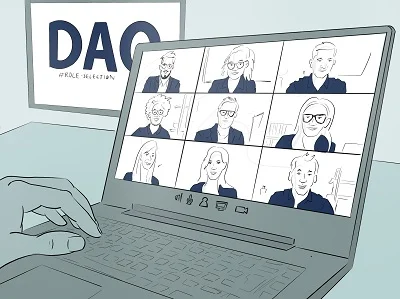DAO | Decentralized Autonomous Organizations in Germany
Comprehensive legal advice on DAOs in Germany
In addition to using cryptocurrencies as a digital payment means and an investment product, the many existing blockchains offer a variety of other uses via their smart contracts. DAOs represent a revolutionary field of activity with enormous future potential.
What is a DAO?
The abbreviation DAO stands for “decentralized autonomous organization.” Roughly speaking, it is a digital organization that is operated and managed democratically by its members in the form of voting. Since a DAO - at least in its pure form - is managed in a completely decentralized manner, there is no need for a central actor (such as a managing director, board of directors, or other executives). Rather, all members collectively decide on any decision-making processes.

How does a DAO work?
Members of a DAO are entitled to participate in voting and to obtain resolutions. The smart contract ensures in an automated manner that all defined rules are observed, e.g., that only DAO members are also able to vote and that their number of votes corresponds to the number of tokens held by the DAO. Smart contracts are special computer protocols that automate the execution of certain actions and processes. These are based on blockchain technology, primarily Ethereum, which is why they are especially transparent and forgery-proof.
If a vote achieves the result that, for example, means from the DAO (usually crypto assets) are to be used to finance a specific project or donated to another organization, the practical implementation of this decision is carried out through the use of a multisignature wallet (MultiSig wallet) of the DAO on which the DAO's assets are located (also often called "treasury wallet").
MultiSig wallets allow a group of people to have shared assets. In this respect, they differ from conventional wallets in that the consent of several parties is required for a transaction. Thus, in order for a transaction to take place, a certain number of MultiSig holders must approve the process, e.g., three out of a total of five MultiSig wallet holders.
What are the advantages of a DAO?
The greatest advantage of a DAO results from the decentralized and transparent structure of the organization. On one hand, each individual investor has a say, which is why the organization operates democratically, distributing decision-making power among all members. Likewise, partial automation reduces the risks of human error.
On the other hand, the use of blockchain technology and a smart contract ensures complete transparency. Every single action can be viewed on the blockchain. In addition, the decentralized structure means that there is no need for a corporate entity, such as a registered office or an e-mail address. Shareholders can easily find information about the company via internet forums (e.g., Discord) and participate in voting via MetaMask and Co.
What are the disadvantages of a DAO?
The advantages are also disadvantages at the same time. In practice, DAOs often struggle to develop strategically unless a governing body "takes the reins." If, for example, the DAO project is to take a different direction or be further developed, this always first requires a vote. If this fails because a majority cannot be formed (repeatedly), this is not very conducive to the development of the organization and is also very time-consuming.
In practice, DAOs cannot participate in traditional legal transactions either. What central company would enter into a contract with an organization consisting of several thousand anonymous individuals if it did not know who its contractual partner was in the first place?
Numerous questions also arise from a tax perspective, e.g.:
- Is the token sale, which is often the starting point for forming a DAO, taxable?
- Who has to pay tax on possible income from trading activities in the treasury wallet?
- And where, i.e., in which country, does the taxation occur?
In the case of tax errors, questions about possible liability will follow:
- Are the MultiSig wallet beneficiaries responsible for possible tax errors?
- Or does liability affect even all investors?
- But what is to be done if they are and remain anonymous?
Moreover, technical problems can, of course, also occur: If there are security gaps in the programming code, for example, these can easily be exposed to attacks from hackers due to the transparency. In this respect, it must be ensured that the code is error-free and does not provide any opportunities for attacks.
How can you join a DAO?
Similar to the purchase of shares in conventional companies, joining a DAO is done by purchasing a token (cryptocurrency) originating from the DAO.
With the obtained token(s), the holder acquires voting rights and can submit proposals for votes, participate in votes, and thus have a say in the future of the project. The more tokens the investor owns, the more weight their voting rights usually carry.
Areas of application for DAOs
Nonprofits or charities, among others, benefit from DAOs. They can use DAOs to recruit members and raise funds all over the world. The application of blockchain technology ensures transparent and democratic decision-making on the issuance or distribution of funds.
DAOs can also be used to collectively invest in valuable assets. Each investor then has a share in the investments.
DAOs can also be found in particular in the sphere of non-fungible tokens (NFTs), which often gather communities strong in numbers around them.
A concrete example of a DAO is the social network Steemit. Users can be paid for their contributions here. How much the payout is depends on how many people voted for the user's particular post.
However, these exemplary fields are by no means the only areas of application. New DAO projects from different sectors are added daily. Advocates for DAOs even go so far as to claim that, in the future, a large proportion of all companies in any sector will use DAOs. It remains to be seen whether, to this extent, the development will become reality. It is, however, a fact that countless DAOs already exist today.
Legal classification of a DAO
The legal classification of a DAO carries many ambiguities. Thus, the very first question that arises addresses which legal system generally governs a DAO. Unlike traditional companies that have a physical headquarters in a locality in the real world, a DAO only operates virtually. The members are located at various points across the globe, and no clear place of origin can be determined for the DAO. Therefore, in order to resolve the question of applicable law, the law in the respective locality of the court seized shall apply. This means that, in the event of a dispute regarding a DAO in this country, a German court will apply German law.
Assuming that the DAO is subject to German law, the question arises as to what the legal form of the DAO is. In any case, legal forms such as a stock corporation (AG) or a limited liability company (GmbH) are not considered for a DAO. This would require, among other things, notarized articles of association and an entry in the Commercial Register. A traditional DAO does not have these. For this reason, a DAO can only be classified within the catch-all provisions of the German Civil Code (BGB): For example, it is conceivable to assume that a DAO is a civil-law partnership (GbR or BGB partnership) or an unincorporated association.
Since various legal characteristics of a civil-law partnership are simply unsuitable for a DAO, a DAO is often an unincorporated association under German law. Incompatible is, for example, the regulation that in principle every partner in a civil-law partnership, i.e., every member of a DAO, has the capability to terminate the partnership. In this case, the dissolution of the civil-law partnership automatically followed. Likewise, it is generally necessary to obtain the consent of all partners to conduct the business of a civil-law partnership. Of course, in DAOs with a large number of members, such unanimity is impossible to achieve. And last but not least, all partners in a civil-law partnership are liable in their private assets.
Tax classification of a DAO in Germany
The legal classification of a DAO in Germany is associated with complicated tax issues. As a civil-law partnership, for example, there would be the risk that all trading income of the DAO could be attributed to the individual DAO members for tax purposes - not a particularly desirable outcome for the members.
For tax purposes as well, it is therefore generally more advantageous to assume that the association has no legal capacity: In this case, only the association would be a potential tax debtor, not the members themselves. Incidentally, it can then also be comparatively easily "converted" into a legally capable association and entered in the Register of Associations. As a registered association, it can then also be recognized as a nonprofit organization, depending on the purpose it fulfills and whether it also wants to create an appropriate Articles of Association for itself.
Foreign legal forms for a DAO
Many DAOs take advantage of foreign legal forms. For example, special regulations for DAOs exist in Wyoming (USA) and on the Marshall Islands. These regulations allow DAOs to establish themselves as limited liability companies (LLC). Whether this is advantageous always depends on the individual case.
In the case of a traditional DAO without any governing body, for example, it may be worth considering "registering" somewhere abroad. On the other hand, if a management team is employed by the DAO, founding in an offshore country usually leads to numerous consequential problems. For example, a DAO LLC abroad would be subject to unlimited tax liability in Germany if the management of the DAO is located in Germany.
Your consultants for DAOs in Germany
Do you have further questions about DAOs or about the foundation of a DAO? Do you want to take advantage of DAOs in your business field? Feel free and come to us. We help you establish your DAO in a legally and fiscally sound manner - gladly in Germany, but also in other international jurisdictions if required.
The best way to reach us is by e-mail (info@winheller.com) or by telephone (+49 69 76 75 77 85 34).
Do you need support?
Do you have questions about our services or would you like to arrange a personal consultation? We look forward to hearing from you! Please fill in the following information.
Or give us a call: +49 69 76 75 77 85 34




